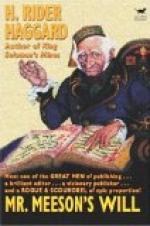“Such, my Lord, are the main outlines of the case that I have to present for the consideration of the Court, which I think your Lordship will understand is of so remarkable and unprecedented a nature that I must crave your Lordship’s indulgence if I proceed to open it at some length, beginning the history at its commencement.”
By this time James Short had completely recovered his nerve, and was, indeed, almost oblivious of the fact that there was anybody present in the court, except the learned Judge and himself. Going back to the beginning, he detailed the early history of the relationship between Eustace Meeson and his uncle, the publisher, with which this record has nothing to do. Thence he passed to the history of Augusta’s relation with the firm of Meeson and Co., which, as nearly everybody in the court, not excepting the Judge, had read “Jemima’s Vow,” was very interesting to his auditors. Then he went on to the scene between Augusta and the publisher, and detailed how Eustace had interfered, which interference had led to a violent quarrel, resulting in the young man’s disinheritance. Passing on, he detailed how the publisher and the published had taken passage in the same vessel, and the tragic occurrences which followed down to Augusta’s final rescue and arrival in England, and finally ended his spirited opening by appealing to the Court not to allow its mind to be influenced by the fact that since these events the two chief actors had become engaged to be married, which struck him, he said, as a very fitting climax to so romantic a story.
At last he ceased, and amidst a little buzz of applause, for the speech had really been a very fine one, sat down. As he did so he glanced at the clock. He had been on his legs for nearly two hours, and yet it seemed to him but a very little while. In another moment he was up again and had called his first witness—Eustace Meeson.
Eustace’s evidence was of a rather formal order, and was necessarily limited to an account of the relations between his uncle and himself, and between himself and Augusta. Such as it was, however, he gave it very well, and with a complete openness that appeared to produce a favorable impression on the Court.




